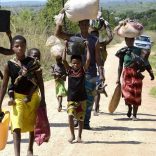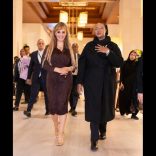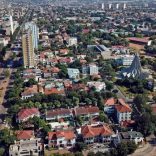Mozambique: Parliamentary Commissions analyse Draft Law on Internally Displaced Persons - Notícias ...
Mozambique: One year without Dhlakama – Savana report

Photo: Savana
- Ossufo Momade will conduct the central tribute ceremonies in Mangunde, Chibabava district, Sofala province
The chieftaincy of Mangunde, in the Chibabava district of Sofala province, bowed again this Friday in tribute to one of the most important figures in the country’s political history in the last 40 years.
It happens today, exactly, the one year anniversary f the death of Afonso Dhlakama, the emblematic leader of Renamo.
Party members, family members, sympathisers and guests will participate in a mass at the family cemetery where his remains lie in Mangunde.
The ceremonies are to be directed by the president of Renamo, Ossufo Momade.
The homage to the historic leader will be replicated at the level of the provincial delegations of the party.
More than marking his death, party members will celebrate his life and work for the edification and consolidation of democracy towards a different Mozambique, said Renamo spokesman José Manteigas, speaking from Portugal to SAVANA/mediaFAX.
Born on January 1, 1953, the life of Afonso Dhlakama has left divided views: a villain to some and a “messiah” to many others, especially those who feel marginalised by the policies and practices of Frelimo, the party in power since national independence in 1975.
Dhlakama was inveterate in defence of the causes in which he believed. He committed himself to the manifesto of the struggle for democracy and died for it, confined to a tiny spot in the Gorongosa Mountains, where he lived surrounded by the Mozambican army.
Irony of the ironies, Dhlakama survived bullets and died a victim of diabetes, a disease that, given his advanced age and social status, was perfectly controllable.
Despite the different views on the figure of Dhlakama, there is unanimity about him being a charismatic leader and voicing the sentiment of many Mozambicans, including leaders and members of Frelimo disappointed at the direction of the country.
At the age of 23, he joined André Matsangaíssa’s National Resistance of Mozambican (Renamo) in 1979 to fight the communist system implanted by Frelimo for 16 years.
With the death of Matsangaíssa in 1979, Dhlakama took the lead of the then guerrilla movement at the height of the civil war which finally culminated in the signing of the General Peace Agreement (AGP) on 4 October 1992.
He is considered by many to be one of the forerunners of national democracy, and he was singled out for bringing about the the death of the one-party system.
ALSO READ: Dhlakama’s death delayed peace talks in Mozambique – analyst
He suffered persecution and attacks, especially in 2013, when he went into exile in Satungira. He left the bush in September 2014 to sign the Cessation of Military Hostilities Agreement, which created conditions for him to take part in the general elections scheduled for that year.
The electoral results that gave the presidential victory to Filipe Nyusi, but with Afonso Dhlakama winning in six provinces, precipitating the country into another round of political-military tension which led him into renewed exile in November, 2015.
On May 3, 2018, his voice was forever silenced at a time when negotiations for an effective and lasting peace with the head of state were at their highest turning point.
Ossufo Momade was chosen to continue Dhlakama’s political project, in an initial phase, as interim coordinator of the Political Commission and, since January, as president of the party, elected by the congress.
Momade, along with Nyusi, continues the negotiations, having achieved significant advances in the agreements, such as the approval of the Amendment of the Constitution of the Republic, which opens space for the election of provincial governors (2019) and district administrators, from 2024, as well as its regulations.
On another front, the two leaders [Nyusi and Momade] secured the reintegration of 14 Renamo senior and general officers for leadership and leadership positions in the Defence Forces of Mozambique. Renamo has recently submitted a list of 10 of its officers to be promoted to senior positions at the Police of the Republic of Mozambique (PRM).
A prophetic leader – Raul Domingos
Raul Domingos, formerly number two in Renamo, recalled his former leader as a person who, in life, fought for democracy, democratic rule of law and human rights.
“He was known for his precise and forceful interventions and, if he were alive, he would welcome what is happening with the arrests of the mentors of corruption scandals that have disgraced thousands of Mozambicans,” he said.
This is because, according to Domingos, his former leader had prophetic vision and warned Mozambicans about the current regime’s dangerousness in terms of corruption and illicit enrichment.
He emphasised that in this prophetic mission, Dhlakama said: “They are marginalising me, but one day they will kneel before me.”
This prophecy, according to Domingos, was fulfilled with the visit of Filipe Nyusi to the Gorongosa mountain to negotiate peace, after the entourage of his predecessor Armando Guebuza having said that it was outrageous for Nyusi to have to go to meet Dhlakama.
Raul Domingos, current president of the Party for Peace Democracy and Development (PDD), says that in part, Dhlakama’s political legacy has been given continuity by his party, given that the decentralisation package has been approved, which in its view adds value to the vote of the population who may now elect the provincial governor, in a first phase and, later, the administrator.
He criticised what he called a “religious follow-up” in regard to the creation of the Secretary of State in the Province (SEP), while there is the provincial governor, which in his opinion constitutes an overlap due to the lack of clarity in the powers of each one.
He praised the progress of the Disarmament, Demilitarisation and Reintegration (DDR) process, but deplored the fact that no mention was made of the reintegration of Renamo personnel into the State Security and Information Services (SISE).
He said that the exclusion of SISE creates an imminent danger of a return to war because the one that was moved 20 years after the AGP resulted in part from the non-restructuring of the national intelligence force and the PRM.
“If reintegration into SISE is not achieved, we will be postponing a problem that could have disastrous repercussions in 10 to 30 years,” he warned.
For the leader of the PDD, it is difficult to succeed a leader like Dhlakama, who had already appropriated the party in terms of management, given the time in which he directed it.
Despite this, he continued, the party is articulate, complied with its programmes, participated in the municipal elections, organised a succession congress and now the national council that elected the Secretary General and everything is directed to participate in the general elections.
He criticised the delay in the election of the new president of the party and the secretary general, which, in his view, should have occurred six months after Dhlakama’s death, and which would have given the party time to tune the party machine for the next elections. As for the dispute over the leadership of the provincial political delegation of Sofala and the city of Beira, Raúl Domingos considers it a test of the leadership capacity of Ossufo Momade.
Domingos says that this Beira issue is an opportunity for Renamo’s new leadership to demonstrate its problem-solving ability, either by persuading or by imposing its deliberations by force.
Renamo seeks identity – João Pereira
Political scientist João Pereira considers that Renamo still suffers the absence of a leader like Dhlakama and it will take time for the country to become used to the new leadership of the party.
He recalled that Dhlakama was a charismatic leader, and the proof is that his teleconferences had more weight than those of Ossufo Momade’s.
But he also notes weak intervention by the current leader on the nation’s hot topics, revealing his political inexperience in comparison with the late leader.
For the academic, Renamo is looking for its identity, learning how to impose itself in the national political arena. Meanwhile, it is occupied with subjects like the accommodation of its personnel in the Defence and Security Forces.
He warns of the need for the party to embrace a nationwide project and not settle for the accommodation of its party elites, which will only cover half a dozen people, leaving the rest of its constituency adrift.
He welcomed the constitutional amendment because it provides assurances that the agreements will be effective and that no one will interfere with governors or administrators.
João Pereira regrets, however, the lack of constitutional amendments ensuring the ‘de-politicisation- of the Defence and Security Forces.
“[These] Renamo officials reintegrated into the ranks of the FADM and those who will go to the PRM may be removed at any time or will have to retire,” he notes.
The debate that Renamo must initiate, says the academic, is the elaboration of a non-partisan defence and security policy, which will lead to constitutional amendments so that the country is not privatised by the two main forces of this country, Frelimo and Renamo.
Meanwhile, Pereira points out, Ossufo Momade is making history as the first Renamo leader to see his decisions permanently challenged, as is happening in the Sofala delegation, which has only subsided thanks to Cyclone Idai.
This type of challenges could reach alarming proportions in the coming days with the appointment of the heads of list for provincial governors, the Assembly of the Republic and provincial assemblies.
This process, he continued, if not well managed, could create tensions and weaken Renamo.
The academic understands that it is time for Renamo to focus on the political debate and show its vision of what it wants from this country, that is, what it will do differently to the current government.
João Pereira points out as a danger to the stability of the main opposition party that it is not financially consolidated.
This difficulty may limit the ability to promote Ossufo Momade’s image for the presidential election in due time.
Pereira says he does not doubt that Renamo, as a party, has its brand consolidated among the bases, but does not have the same guarantee as regards Ossufo Momade.
A setback – Alice Mabota
Human rights activist Alice Mabota says there is no doubt that, although a year has passed, Dhlakama’s death has been a setback for national democracy and Renamo.
She points out that Renamo needs strong direction and a structuring vision for the country, because if Frelimo survived after the death of Samora Machel, it was thanks to the state apparatus, because everything was broken, she said.
Mabota sees in Afonso Dhlakama a leader who dialogued with all spheres of society to perceive and outline a project that embraced the different feelings of Mozambicans.
The former president of the Human Rights League (LDH) is concerned that Dhlakama did not prepare groom anyone to continue his political project.
The titanic struggles within Renamo, she says, were unthinkable in the time of the late leader.
The human rights activist also criticises the lack of a national project by the new leadership of the main opposition party.












Leave a Reply
Be the First to Comment!
You must be logged in to post a comment.
You must be logged in to post a comment.